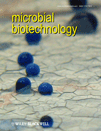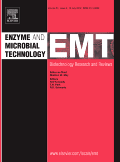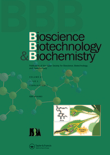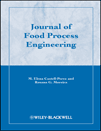
PREPARATIVE BIOCHEMISTRY & BIOTECHNOLOGY
Scope & Guideline
Pioneering research for transformative biotechnological solutions.
Introduction
Aims and Scopes
- Biochemical Engineering and Process Optimization:
Research in this area emphasizes the development and optimization of bioprocesses, including fermentation and extraction techniques, to enhance yield and efficiency in producing valuable biochemical products. - Microbial Biotechnology:
The journal frequently publishes studies involving the use of microorganisms for the production of enzymes, bioactive compounds, and biopolymers, highlighting innovative microbial strains and fermentation conditions. - Natural Product Chemistry:
There is a strong focus on isolating and characterizing natural compounds from plants, fungi, and bacteria, with applications in pharmaceuticals, food technology, and environmental remediation. - Enzyme Technology:
Research related to enzyme production, purification, and application, particularly in industrial biocatalysis, is a core area, showcasing advances in enzyme engineering and immobilization techniques. - Statistical and Computational Methods in Bioprocessing:
The integration of statistical design methodologies and computational approaches, such as response surface methodology (RSM) and artificial neural networks (ANN), for optimizing bioprocess conditions is a recurring theme in the journal.
Trending and Emerging
- Sustainable and Green Bioprocessing:
There is a growing focus on sustainable practices, including the utilization of agro-industrial waste and green chemistry approaches for the production of biochemicals, indicating a trend towards environmentally friendly methodologies. - Biopolymers and Biodegradable Materials:
Research on biopolymers, particularly those derived from microbial sources, is gaining momentum, highlighting the need for sustainable alternatives to conventional plastics in various applications. - Nanobiotechnology:
The integration of nanotechnology in biochemistry, particularly in the synthesis and application of nanoparticles for biomedical and environmental purposes, is emerging as a significant area of interest. - Metabolic Engineering and Synthetic Biology:
There is an increasing trend towards metabolic engineering and synthetic biology approaches to enhance the production of valuable compounds in microbial systems, reflecting advances in genetic engineering techniques. - Antimicrobial and Antioxidant Applications of Natural Extracts:
Research focusing on the antimicrobial and antioxidant properties of natural products, particularly those derived from plants and microorganisms, is on the rise, driven by the demand for natural alternatives in healthcare and food preservation.
Declining or Waning
- Conventional Extraction Techniques:
Research on traditional extraction methods, such as solvent-based techniques, has decreased as newer, more efficient extraction technologies (e.g., microwave-assisted, ultrasound-assisted) gain popularity. - Basic Enzyme Characterization without Application Context:
Papers focusing solely on the characterization of enzymes without direct application or optimization for specific industrial processes are becoming less common, reflecting a shift towards more applied research. - Plant-Based Bioproducts with Limited Novelty:
Studies on well-established plant-based bioproducts that do not introduce novel methodologies or significant advancements are appearing less frequently, as the field moves towards innovative and impactful research.
Similar Journals

BIOTECHNOLOGY AND APPLIED BIOCHEMISTRY
Transforming Discoveries into Applications.BIOTECHNOLOGY AND APPLIED BIOCHEMISTRY, published by Wiley, is a renowned journal that bridges the gap between fundamental research and practical applications in the fields of biochemistry and biotechnology. With an ISSN of 0885-4513 and an E-ISSN of 1470-8744, this journal has been instrumental since its inception in 1986, focusing on diverse topics including applied microbiology, drug discovery, and process chemistry. The journal is currently recognized in various categories with impressive quartile rankings, showcasing its influence with placements in Q2 for applied microbiology, biotechnology, and biomedical engineering, among others. Researchers and professionals benefit from its comprehensive scope and critical insights into the latest advancements in these domains. Although not an open-access journal, it provides invaluable access options for academic institutions and professionals seeking to stay at the forefront of biotechnology innovations. Its commitment to presenting quality research facilitates the growth of knowledge and fosters collaborations across disciplines, making it an essential resource for anyone invested in the rapidly evolving landscape of biosciences.

Synthetic and Systems Biotechnology
Fostering Collaboration in Cutting-edge BiotechnologySynthetic and Systems Biotechnology, published by KEAI PUBLISHING LTD, is a pioneering open-access journal that has made significant contributions to the fields of applied microbiology, biotechnology, biomedical engineering, genetics, and structural biology since its inception in 2016. With an ISSN of 2405-805X, this journal is committed to fostering innovative research and interdisciplinary collaboration, providing a platform for the dissemination of high-quality studies that push the boundaries of scientific knowledge. Recognized for its excellence, it holds prestigious Q1 rankings in both Applied Microbiology and Biotechnology as well as Biomedical Engineering in 2023, alongside notable Q2 rankings in Genetics and Structural Biology. Researchers, professionals, and students alike can access cutting-edge research that explores the dynamic interplay between synthetic biology and systems biology, driving advancements that could reshape health, industry, and environmental sustainability. By operating under an open-access model, Synthetic and Systems Biotechnology ensures that new findings are accessible to a global audience, thereby maximizing the impact and reach of the published work and paving the way for future discoveries.

Biocatalysis and Agricultural Biotechnology
Empowering Research for Food Security and Environmental SustainabilityBiocatalysis and Agricultural Biotechnology, published by Elsevier, is a distinguished journal in the fields of agronomy, biotechnology, and applied microbiology. With an E-ISSN of 1878-8181, this journal has an impressive impact factor and consistently ranks in the top quadrants of Scopus, notably Q1 in Agronomy and Crop Science and Q2 in several related categories. Since its inception in 2012, it aims to bridge the gap between biocatalysis applications and agricultural practices, fostering innovative research that advances sustainable agriculture and biotechnological applications. The journal is highly regarded, with a Scopus rank of #47 out of 406 in Agronomy and Crop Science, exemplifying its significance in the academic community. As an essential resource for researchers, professionals, and students, it provides a platform for sharing cutting-edge findings that address crucial global challenges in food security, environmental sustainability, and biotechnological advancements. Located in Amsterdam, Netherlands, the journal continues to contribute to the growth and interdisciplinary dialogue in agricultural and biological sciences.

Microbial Biotechnology
Pioneering breakthroughs in applied microbiology and biotechnology.Microbial Biotechnology, published by WILEY, stands at the forefront of innovation in the field of applied microbiology and biotechnology, showcasing cutting-edge research and advancements within both academic and industrial contexts. As an Open Access journal since 2012, it ensures that high-quality research is easily accessible to researchers, professionals, and students globally, promoting knowledge sharing and collaboration. With an impressive impact, the journal holds a Q1 ranking in its categories—Applied Microbiology and Biotechnology, Biochemistry, Bioengineering, and Biotechnology—demonstrating its significance in the scientific community. The journal currently boasts a strong Scopus ranking in several relevant disciplines, including a top 10% position in Applied Microbiology and Biotechnology, highlighting its critical role in disseminating influential findings. Designed to foster dialogue and advance technology within the microbial sciences, Microbial Biotechnology is an essential resource for anyone committed to leveraging microbial processes for sustainable and innovative solutions.

ENZYME AND MICROBIAL TECHNOLOGY
Unleashing the Power of Enzymes and MicroorganismsENZYME AND MICROBIAL TECHNOLOGY, a premier journal published by Elsevier Science Inc, serves as a pivotal platform for researchers and professionals dedicated to exploring the dynamic intersections of microbiology, biochemistry, and bioengineering. With a rich publication history dating back to 1979 and converging until 2024, this journal has established itself within the Q2 quartile rankings across multiple categories, including Applied Microbiology and Biotechnology, Biochemistry, Bioengineering, and Biotechnology, highlighting its influential role in advancing scientific discourse. It holds impressive Scopus rankings, where it is recognized in the 79th percentile for Applied Microbiology and Biotechnology and ranks favorably in related fields, making it a valuable resource for academic and industrial researchers looking to stay abreast of the latest developments. Although it does not currently offer Open Access options, ENZYME AND MICROBIAL TECHNOLOGY remains an essential read for anyone invested in the biotechnological applications of enzymes and microorganisms.

BIOSCIENCE BIOTECHNOLOGY AND BIOCHEMISTRY
Transforming Scientific Knowledge into Technological AdvancementsBIOSCIENCE BIOTECHNOLOGY AND BIOCHEMISTRY, published by Oxford University Press, stands out as a vital resource for scholars and professionals in the fields of biotechnology, biochemistry, and analytical chemistry. With an ISSN of 0916-8451, this esteemed journal has been publishing significant research since its inception in 1988, focusing on the convergence of biological sciences and their technological applications. The journal is recognized within several important categories, holding a Q3 ranking in prominent areas such as Analytical Chemistry, Applied Microbiology and Biotechnology, and Biochemistry, among others, as of 2023. Its diverse scope fosters innovation, inviting submissions that address contemporary challenges and advancements in life sciences. Although currently not open access, it offers invaluable insights and findings essential for researchers, professionals, and students dedicated to pushing the boundaries of science. With its rigorous peer-review process, BIOSCIENCE BIOTECHNOLOGY AND BIOCHEMISTRY continues to contribute significantly to the scientific community, solidifying its reputation as a key publication for those exploring the dynamic interplay of biology and technology.

JOURNAL OF FOOD PROCESS ENGINEERING
Innovating the future of food processing technologies.JOURNAL OF FOOD PROCESS ENGINEERING, published by WILEY, is a prestigious academic journal dedicated to advancing the field of food processing through innovative engineering research and practical applications. With an ISSN of 0145-8876 and an E-ISSN of 1745-4530, this journal serves as a crucial platform for researchers and professionals focusing on the intersection of chemical engineering and food science. Operating in the United States and established in 1977, it has gained a reputation for its rigorous peer-review process and high-quality publications, reflected in its Category Quartiles of Q2 in both Chemical Engineering (miscellaneous) and Food Science for 2023. The journal is also well-positioned within the Scopus rankings, holding the 104th spot out of 389 in Agricultural and Biological Sciences and the 82nd in General Chemical Engineering. While it currently does not offer Open Access options, the JOURNAL OF FOOD PROCESS ENGINEERING remains an indispensable resource for those looking to explore critical studies and developments that shape food processing technologies by the year 2024 and beyond.

Izvestiya Vuzov-Prikladnaya Khimiya i Biotekhnologiya
Bridging Knowledge Gaps in Chemistry and BiotechnologyIzvestiya Vuzov-Prikladnaya Khimiya i Biotekhnologiya, published by Irkutsk National Research Technical University, is a prominent open-access journal dedicated to advancing the fields of applied chemistry and biotechnology. Since its inception in 2011, this journal has provided a platform for the dissemination of significant research findings, innovative techniques, and technological advancements that bridge the gap between theoretical frameworks and practical applications. The journal is indexed in various databases, ensuring that published works reach a global audience of researchers, professionals, and students eager to explore the latest developments in these critical disciplines. With its commitment to open-access publishing, Izvestiya Vuzov-Prikladnaya Khimiya i Biotekhnologiya plays a vital role in fostering collaboration and knowledge sharing within the scientific community, thus contributing to the advancement of both fields in a rapidly evolving technological landscape.

Research Journal of Biotechnology
Connecting global minds in applied microbiology and bioengineering.Research Journal of Biotechnology is a premier publication dedicated to advancing the field of biotechnology through the dissemination of impactful research articles. Published by Research Journal Biotechnology in India, this journal operates under an Open Access model, facilitating unrestricted access to high-quality research for researchers, professionals, and students worldwide. With an ISSN of 2278-4535 and an E-ISSN of 2278-4535, the journal aims to serve as a comprehensive platform for innovative studies in Applied Microbiology and Biotechnology, Bioengineering, and Biotechnology. Despite its current Q4 quartile ranking in these categories, the journal aspires to extend its influence and visibility in the academic community, aiming for greater impact in the future. The journal features research articles that span a wide array of topics in biotechnology, fostering a collaborative and knowledge-rich environment for national and international scholars. We invite you to explore, contribute to, and engage with the expanding landscape of biotechnological research through the Research Journal of Biotechnology.

FOOD SCIENCE AND BIOTECHNOLOGY
Advancing the Future of Food and BiotechnologyFOOD SCIENCE AND BIOTECHNOLOGY, published by the Korean Society of Food Science & Technology (KOSFOST), stands as a prominent peer-reviewed journal dedicated to advancing knowledge in the fields of food science, biotechnology, and applied microbiology. With ISSN 1226-7708 and E-ISSN 2092-6456, this journal serves as a pivotal platform for disseminating high-impact research from South Korea and beyond, reflecting a robust Q2 ranking in multiple categories including Applied Microbiology and Biotechnology, Biotechnology, and Food Science as of 2023. The journal's influence is further emphasized by its positions in various Scopus ranks, where it showcases a commendable percentile ranking in Agricultural and Biological Sciences and Biochemistry. Although access options remain limited, the journal’s objectives revolve around the publication of innovative research, fostering interdisciplinary collaboration, and facilitating the exchange of ideas among a diverse community of researchers, professionals, and students. Whether you are involved in food technology, microbial biotechnology, or nutritional sciences, FOOD SCIENCE AND BIOTECHNOLOGY are instrumental in shaping the future of these critical fields, propelling advancements that enrich our understanding of food systems and health.